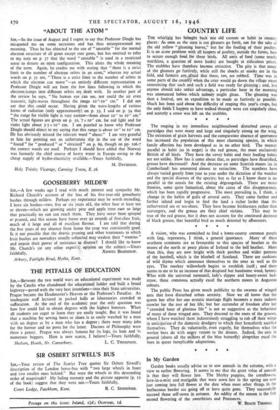A visitor, who was astonished to find a home-county common
purple with ling, represents, I think, a general ignorance. Many of these southern commons are as favourable to this species of heather as the moors of the north or peaty plains of Ireland to the bell heather. More than this, they are now bright with thick patches and wider- patterns of the harebell, which is the bluebell of Scotland. There are cushions of wild thyme -which announce themselves to the nose as well as the eyes. The rosebay willowherb begins to establish itself; and there seems to me to be an increase of that despised but handsome Weed, betony. What with the universal tormentil, lady's slipper and honey-sweet bed- straw, these commons actually excel the northern moors in Augustan colours.
The public Press has given much publicity to the swarms of winged ants that have disturbed urban serenity. Now we all know that the queen bee after her one ecstatic marriage flight becomes a mere indoors crawler for the rest of her life; but her surrender of freedom after her "crowded hour of glorious life" is not so suggestive as the behaviour of many of these winged ants. They descend to the roots of the grasses, where I have watched them industriously struggling to rub off their wings in anticipation of the domestic drudgery to which they henceforth sacrifice themselves. They do voluntarily, even eagerly, for themselves what. the worker bees do with angry venom to the drones. Indeed, the ants in general (above all the milkers of the blue butterffy) altogether excel the bees in .queer inexplicable adaptations.


























 Previous page
Previous page